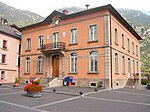Fortress Saint-Maurice is one of the three main fortification complexes comprising the Swiss National Redoubt. The westernmost of the three, Fortress Saint-Maurice complements Fortress Saint Gotthard and Fortress Sargans to secure the central alpine region of Switzerland against an invading force. The National Redoubt was first conceived in the 1880s as an easily defensible area to secure the survival of the Swiss Confederation. In the late 1930s and 1940s when neutral Switzerland was threatened with invasion from Germany, the National Redoubt and its components were modernized and expanded on a massive scale. The fortification system was maintained and upgraded during the Cold War. With the collapse of the Soviet Union, the possibility of a Warsaw Pact invasion disappeared, and by 1995 many positions were abandoned by the military.
Fortress Saint-Maurice encompasses the area around Saint-Maurice in the western, French-speaking portion of Switzerland. The Rhône river leaves the central Alpine region at Saint-Maurice through a narrow defile, between 4000m mountains to the south and 3000m mountains to the north. The only comparatively easy access to the upper Rhône valley, and thus to the western National Redoubt, is through Saint-Maurice. Fortress Saint-Maurice is a series of fortifications set into the mountains on either side of the valley, dominating the region as far as Lac Léman with their artillery. The principal fortification is the enormous Fort de Dailly, supported by forts Savartan, Scex and Cindey, as well as lesser positions. The extent of the area designated as Fortress Saint-Maurice is not clearly defined, but according to the Association Fort de Litroz, the Saint-Maurice sector comprises the Rhône narrows from just north of Saint-Maurice to Martigny, excluding Chillon and Champillon, as well as the fortifications of the lateral valleys.







